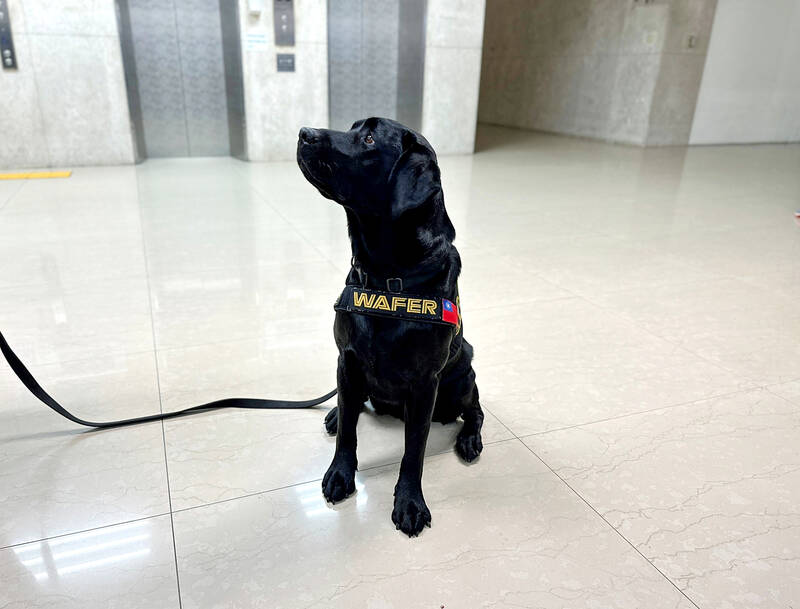Taiwan’s first electronic storage device detection dog (K9 ESD), Wafer, has helped in three major crime cases, the Central Investigation Bureau (CIB) said yesterday at a news conference in Taipei, which also marked Wafer’s first public appearance.
Since arriving in Taiwan in August last year, Wafer has found hidden devices belonging to the main suspect in a methamphetamine bust and helped investigations into election gambling, scam and money laundering cases, the CIB said.
A K9 ESD is trained to sniff out the chemical substance triphenylphosphine oxide (TPPO), which is found in electronic storage devices such as cellphones, hard drives, flash drives or cold wallets for cryptocurrency that might contain illegal content and evidence of criminal activity, the CIB said.

Photo: CNA
Wafer reacts to confirm the locations of storage devices at investigation sites, the CIB said, adding that since its arrival, the sniffer dog has helped police find cellphones and tablets hidden in bedside cabinets and closets by crime ring members.
Wafer was donated to Taiwanese police force by the US-based nonprofit organization Operation Underground Railroad (OUR), which fights human trafficking and sexual exploitation.
OUR Asian division vice chair Nate Davis said new forms of crime require police to adopt new equipment and approaches, and Wafer can help detect electronic devices, giving investigators access to any criminal information stored on them.
CIB International Criminal Affairs Division researcher Lee Kun-ta (李昆達) said officers at the National Police Agency’s Third Special Police Corps underwent training in the US after coordinating with US Department of Homeland Security investigators and the OUR in July last year.
Wafer was brought to Taiwan to support law enforcement in the following month.
Davis told the press that the OUR donated a K9 ESD to Taiwan because the country works hard to fight human trafficking.
Wafer was named as a nod to Taiwan’s semiconductor industry, he added.

A strong continental cold air mass is to bring pollutants to Taiwan from tomorrow, the Ministry of Environment said today, as it issued an “orange” air quality alert for most of the country. All of Taiwan except for Hualien and Taitung counties is to be under an “orange” air quality alert tomorrow, indicating air quality that is unhealthy for sensitive groups. In China, areas from Shandong to Shanghai have been enveloped in haze since Saturday, the ministry said in a news release. Yesterday, hourly concentrations of PM2.5 in these areas ranged from 65 to 160 micrograms per cubic meter (mg/m³), and pollutants were

Taiwan’s armed forces have established response protocols for a wide range of sudden contingencies, including the “Wan Chun Plan” to protect the head of state, the Ministry of Defense (MND) said today. After US President Donald Trump on Saturday launched a series of airstrikes in Venezuela and kidnapped Venezuelan President Nicolas Maduro, concerns have been raised as to whether China would launch a similar “decapitation strike” on Taiwan. The armed forces regularly coordinate with relevant agencies and practice drills to ensure preparedness for a wide range of scenarios, Vice Minister of National Defense Hsu Szu-chien (徐斯儉) told reporters before a

EVA Airways on Saturday said that it had suspended a pilot and opened an investigation after he allegedly lost his temper and punched the first officer several times as their plane was taxiing before takeoff at Los Angeles International Airport. According to a report published on Thursday by The Reporter, the incident occurred after the flight’s Malaysian first officer tried to warn the Taiwanese pilot, surnamed Wen (文), that he was taxiing faster than the speed limit of 30 knots (55.6kph). After alerting the pilot several times without response, the first officer manually applied the brakes in accordance with standard operating

The New Taipei City Social Welfare Department on Thursday celebrated Paralympic competitor Chen Tzu-wei (張孜維), who received last year’s national Golden Eagle award for exemplary achievement by Taiwanese with disabilities. Chen, who suffers from childhood-onset muscular dystrophy, did not attend the first award ceremony held by the Ministry of Health and Welfare in November due to illness. Chen was formally presented with the award at the department, where he gave thanks to government workers for supporting his education and livelihood, the department said in a statement. Chen was raised by the Ai-hsin Home for Persons with Disabilities in the city’s Bali District (八里)